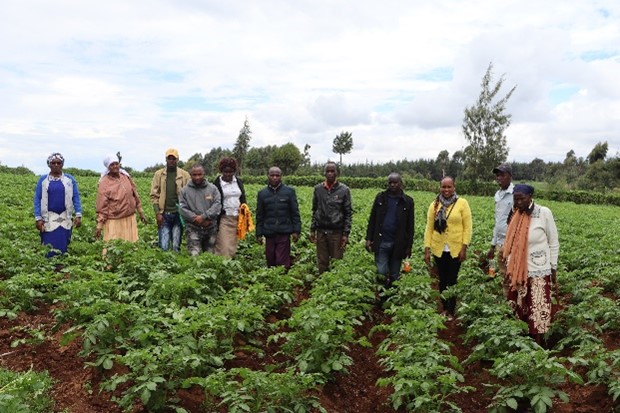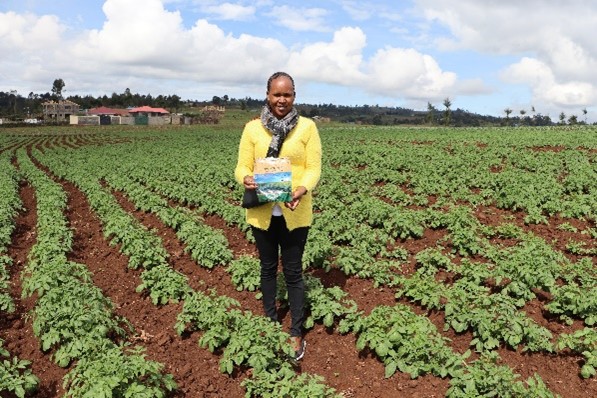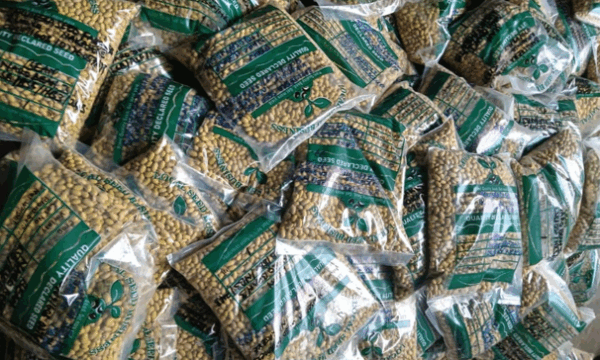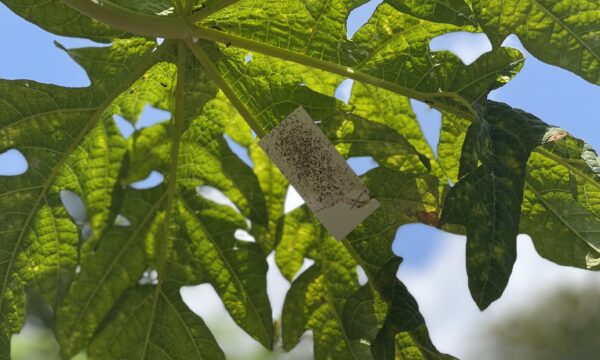Integrated Pest Management (IPM) is one of the tools for low-pesticide-input pest management. In the heart of Kenya’s Nakuru County, a PlantwisePlus initiative is underway. It aims to upskill and support women and young people to initiate agribusinesses that champion low-risk pest control products and practices. These micro-businesses provide employment for the trainees, while farmers benefit from access to and use of more sustainable methods of crop pest management.
Safer, higher-quality food
The work aims to increase the supply of, and demand for, safer, higher-quality, locally produced food in domestic markets- a key objective of the PlantwisePlus programme. This initiative is a collaboration between CABI and partners – The County Government of Nakuru, Koppert Biological Systems, Agrochemical Association of Kenya (AAK) and The Pest Control Products Board (PCPB).
Through PlantwisePlus, a cohort of women and young men were trained to be Integrated Pest Management (IPM) champions and Spray Service Providers (SSPs), mainly involving young men, in September 2022. As specialized advisors, they provide advice to farmers on IPM practices, are last-mile delivery of inputs to farmers and, where needed, apply crop protection products, helping to ensure the safe handling of pesticides.

Integrated Pest Management champions
The IPM champions, a group of individuals passionate about sustainable farming practices, met on the first day of the workshop. The meeting reviewed how many farmers the IPM champions had trained and advised on agricultural production. They also looked at the quantity of biofertilizer and stick /pheromone traps sold and the amount of money made by the IPM champions.
During a recent workshop in Nakuru, the CABI and partners reviewed the progress made by the women and young men in providing agribusiness services and inputs to smallholder farmers.
Farmers benefiting from the initiative
The review showed that the IPM champions had conducted over 100 farmers’ trainings, benefiting more than 3,700 smallholder farmers. The Nakuru county agricultural officers found this number a commendable achievement, especially as it was more significant than agricultural officers in the county could deliver.
Strategies used by the IPM champions to promote their services included installing demo plots and showcasing the performance of biofertilizers and sticky traps. These approaches helped convince farmers to buy the products. As a result, some individuals had made over KES 10K (~ 70 USD, 55 GBP) in commissions.
Spray Service Providers
Equally impressive were the SSPs. PlantwisePlus trained the SSPs to apply pesticides and hire out their services to farmers as spray service providers. The SSP model is a cost-effective one, requiring minimal capital investment.
The SSP review found that the providers collectively earned over KES 400K (~ 2,730 USD, 2,200 GBP) during the peak agricultural season. Some SSPs had further invested in motorized spray pumps, amplifying their reach and impact. By offering advisory services and applying pest control products, they gain employment that promotes crop production and pest management practices that are good for human health and the environment.

Integrated Pest Management champions leveraging new skills
The workshops highlighted various benefits brought about by the upskilling initiative in Nakuru. Firstly, the IPM champions are leveraging the knowledge and skills gained from the training to tackle plant health challenges on their own farms. Moreover, their newfound expertise enables them to confidently engage with fellow farmers to help them address agricultural concerns. For example, identifying pests and diseases and recommending IPM strategies to combat them. Not only does this improve farmer yields, but it provides them with a source of income.
The IPM champions and SSPs have also learned other essential skills like calibrating spray pumps and selecting appropriate pesticides. This comprehensive knowledge enhances their capabilities and boosts their credibility within their respective farming communities. The trust earned is now extending beyond their farming peers. Many are now known within the community as ‘consultants’ or ‘agricultural officers’. This recognition opens doors for collaboration with public administrations and other organizations supporting young individuals in the agricultural sector.
New employment opportunities
The training programme equips women and young people with skills, knowledge and resources. It also creates pathways to meaningful employment, environmentally conscious practices, and improved food security.
As the IPM champions and SSPs continue to evolve and thrive, it’s clear that their impact extends far beyond their individual businesses. They are becoming role models, catalysts for change, and champions of sustainable farming practices.
About PlantwisePlus
PlantwisePlus is financially supported by the Directorate-General for International Cooperation (DGIS), Netherlands; European Commission Directorate General for International Partnerships (INTPA, EU); the Foreign, Commonwealth & Development Office (FCDO), United Kingdom; the Swiss Agency for Development and Cooperation (SDC); the Australian Centre for International Agricultural Research (ACIAR); the Ministry of Agriculture of the People’s Republic of China (MARA)
All images ©CABI
Related News & Blogs
Training Sri Lanka’s agro-dealers in pesticide risk reduction
Agro-dealers provide vital support to Sri Lanka’s farmers. These agricultural input suppliers are often the first point of contact for smallholders who need advice on plant protection products. However, agro-dealers often lack formal training in safer…
3 July 2025




